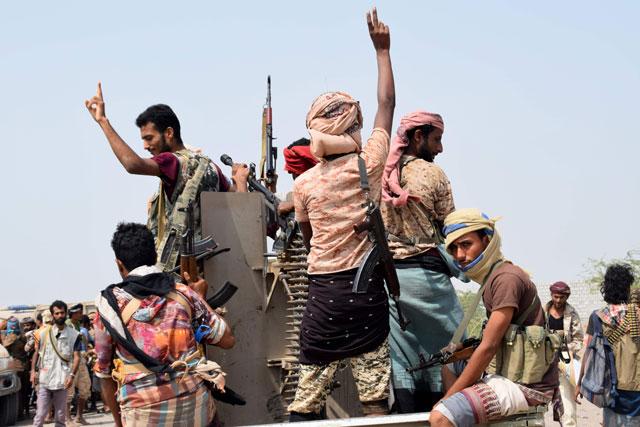You are here
Battle continues for Yemen’s key port of Hodeida
By AFP - Nov 07,2018 - Last updated at Nov 07,2018

Yemeni pro-government forces advance towards the port area from the eastern outskirts of Hodeida, as they continue to battle for the control of the city controlled by Houthi rebels, on Tuesday (AFP photo)
SANAA — Yemeni forces backed by a Saudi-led coalition launched operations in June to retake the port city of Hodeida, through which 70 per cent of the destitute country's aid arrives and which has been under rebel control since the start of the war in 2014.
There was a lull as the UN tried to bring the warring parties together for peace talks. But the fighting resumed in September, intensifying in the past week with 200 combatants reported dead and pro-government forces advancing on the city.
Here is an overview of the battle for Hodeida:
Offensive launched
Government forces launch their offensive on June 13 after receiving a green light from the Saudi-led coalition that provides them with essential air and ground support.
The coalition, which includes the United Arab Emirates (UAE), carries out more than a dozen air strikes on Houthi positions on the outskirts of Hodeida.
Rebel chief Abdel Malek Al Houthi vows to resist the offensive, urging his forces to "confront the forces of tyranny".
The UN Security Council calls for the Hodeida Port to be kept open for deliveries of vital food and humanitarian supplies.
Rebel airport base seized
On June 20 government forces announce they have taken control of a rebel base at the disused Hodeida Airport after heavy fighting backed by coalition air strikes.
After a pause in the offensive, there is heavy bombing south of Hodeida which sources say on July 3 killed more than 50 people, including civilians, over two days.
Witnesses in the city say the rebels have dug dozens of trenches and established defensive positions, blocking the roads with blocks of concrete and containers.
Peace bid fails
After talks with UN envoy Martin Griffiths, Houthi on July 17 says he is ready to hand over control of the port to the UN if the Saudi-led coalition halts its offensive.
On August 2 Griffiths announces talks between the warring sides in Geneva on September 6. They would be the first since fruitless negotiations held in Kuwait in 2016.
The same day there are air strikes on the city that kill 55 civilians and wound dozens of others. On August 23 air strikes by coalition warplanes kill 26 children and four women south of Hodeida, the UN says.
The start of the Geneva talks are delayed as the rebel delegation issues a list of preconditions before travelling to Switzerland.
By September 8 the peace effort is declared a failure with the rebels still refusing to make the journey without guarantees over their return to Sanaa.
Fighting resumes
On September 9 there are new clashes and air strikes around Hodeida, which hospital sources say leave 84 people dead.
However it is only on September 18 that the coalition formally announces its offensive has resumed.
Dozens of civilians are caught up in the fighting, including on October 24 when at least 21 are killed in air strikes on vegetable packaging facility in Hodeida province, according to the UN. The rebels blame the Saudi-led coalition.
US demands a halt
On October 30 US Secretary of Defence Jim Mattis makes a surprise call for a ceasefire and negotiations within the next 30 days. The United States has faced fierce criticism for its role in supporting the coalition.
The United Nations says the following day it aims to relaunch peace talks "within a month".
As fighting nears hospitals in the city, international aid groups on November 7 appeal for the warring parties to spare civilians and civilian infrastructure.
The rebel chief, Houthi, meanwhile vows in a television address that his forces will never surrender.
Related Articles
ADEN — Saudi-led coalition air strikes in Yemen have killed almost 80 Houthi rebel fighters over 48 hours in the w estern province of Hodeid
HODEIDA, Yemen — Saudi-led coalition air strikes reportedly killed eight Yemeni Houthi rebels near the port of Hodeida on Monday, triggering
HODEIDA, Yemen — A Houthi rebel advance near Yemen's lifeline port of Hodeida and a Saudi pullback have displaced more than 6,000 people, th















